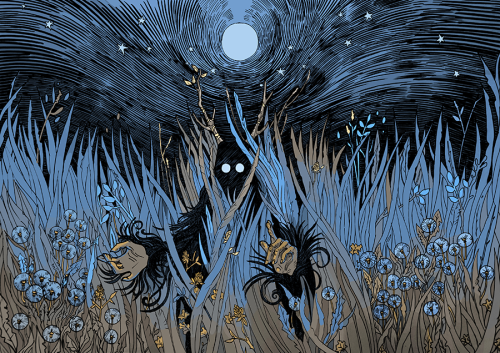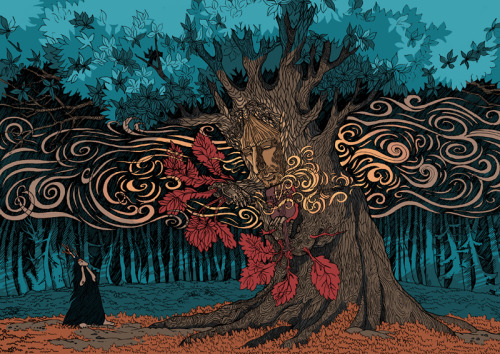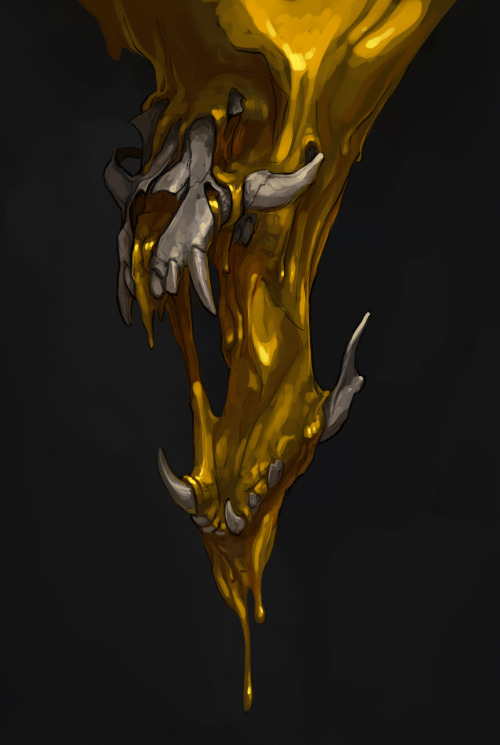Art Of Maquenda, Dukkha Lustre

Art Of Maquenda, Dukkha Lustre
More Posts from Saintedsorcery and Others



by yanadhyana

Goldfish breeds and other aquarium fishes, their care and propagation, 1908
Some UPG, as a treat…
So angels (or the beings we refer to as angels) are the architects of creation. By their very nature they form reality out of the limitless potentiality. They form energy into matter, the take chaos and make it into order. This is instinctual and unconscious. They do it because it is what they are.
Daemons are the opposite of this. They are beings of decay and rot. I think of them almost like mushrooms. They thrive on and help speed up the entropy of reality. Matter to energy, order to chaos, again this is just what they are.
This is not a case of right it wrong, benevolence or malice. They are simply two ends on the spectrum of reality. They do not oppose each other as enemies but simply as opposites, doing their part in the grand scheme of things.

Your Sight shall be in my Sight
in whose name you rest here
I will not disturb you
but hoped that you
in the name of peace may sleep
so that I may see the Hidden
and see its power
hear in celebration
and help in need.
Could you
O Holy Ghost
give to me of your power
In the name of the Holy Crucified One
Amen.
— From The Graveyard Wanderers— The Wise Ones And The Dead In Sweden by Thomas Johnson
These words were uttered as their speaker crossed themselves over a gravestone in a churchyard. When the speaker had finished the invocation, they then made the sign of the cross over each of their eyelids, three times. To the Klok— “The Wise Ones”, the folk healers and magicians of Scandinavia— graveyards, burial mounds, old execution sites and other such areas where the spirits of the dead dwelt were sacred places. In Sweden, these individuals were known as Kyrkogårdsgångare, or Graveyard Walker. The term is related to gengångare, which in Swedish means “those who walk again”. The word can be translated as “ghost”, but their form is entirely corporeal; not see-through or specter-like as phantoms in the Anglosphere tend to be.
The dead serviced the Graveyard Walkers in many ways. One could summon the spirits of the departed and ask for their service in everything from revealing secrets and hidden knowledge to obtaining lottery numbers. Or, a Graveyard Walker could utilize the dead in a more tangible fashion: both the left collar bone of an elderly man and the left ring finger of a corpse were considered to be among the best amulets for protection. (However, before the Wise One left the earthly plane, they must of course return the borrowed bone back to its original resting place.) Everything, right down to the very soil of the graveyard, was used: from rubbing Graveyard dirt on the skin to cure rashes, to drinking it in a slurry to restore a loss of appetite.
But how did one become a Graveyard Walker and a Wise One? There is the aforementioned invocation of course, but there was also the ancient practice of Uttesittning. Uttesittning is a ritual where one meditates in nature from sunset to sunrise, opening the soul and merging with the world of the spirits. There is one legend where one would go to a churchyard or any other places affiliated with burial or the dead for three consecutive Thursday nights to perform an Uttesittning ritual (Thursdays were important, as they were sacred to the old god Thor). On the third and final Thursday, a dark man might perhaps appear and reward the one performing this ritual with a gift. There are some stories that claim that the gift was a Book of Black Arts— a Svarteboken, or “black book”, also known as a Cyprianus (named after St. Cyprian). It was said these Black Arts Books would be written in blood, or written on black pages with white ink. A Wise One would keep all their spells in such books, which contained everything from Kabbalist literature to farm and home recipes.
The Wise Ones and Graveyard Walkers are endlessly fascinating to me, as well as folk magic in general. I hope to create many more artworks inspired by this topic, and I hope that I’ve piqued your interest in it as well!
For more books on this subject:
Gårdbäck, Johannesburg Björn. Trolldom: Spells and Methods of the Norse Folk Magic Tradition. The Ironwode Institution for the Preservation and Popularization of Indigenous Ethnomagicology (YIPPIE), 2015.
Johnson, Thomas. The Graveyard Wanderers — The Wise Ones and the Dead in Sweden. Society of Esoteric Endeavor, 2013.
Sibley, J.T. The Way of the Wise. XLIBRIS, 2013.
A special thanks to my friend Eli, for all your insight into Swedish folklore and folk magic!





The book says that these are talismans that are meant to be re drawn on paper and carried with you to give the you these abilities.
The Book of Oberon

Covet this.


Join me on my journey to finally unbalance my hormones, toxify my body, boost my inflammation, maximize my cortisol and absolutely destroy my gut health.
if you blow out candle you BLOW AWAY the MAGIC and ur spell goes pllphfphphphhhhhhbbb into the wind and WON'T WORK
Korean Folk Magic (Herbs): Sogeum

Sogeum 소금 is salt! It is used in various household god rituals, including feeding Yongwang 용왕 and rites to prevent fires.
It is also used to purify spaces, chase out negative entities and repel bad luck.
There actually isn’t a lot that’s different with how korean folk magic uses salt. Because of its color (white) it is connected to purity. Because of salt’s effects on food (keeping it longer before spoiling) it is connected to dispelling misfortune.
We usually sprinkle it in all corners of the home to purify and cleanse before a rite.
소금 can also be used for offerings, primarily to certain Gashin 가신 (household gods) like Samshin 삼신, the Goddess of Childbirth.
Keep a small bottle or packet of salt on you at all times. If you suddenly get a bad feeling, sprinkle the salt in its direction.

-
 sage-oceiros liked this · 1 month ago
sage-oceiros liked this · 1 month ago -
 caput-larvae reblogged this · 2 months ago
caput-larvae reblogged this · 2 months ago -
 furniturepasture liked this · 1 year ago
furniturepasture liked this · 1 year ago -
 yerbasagrada liked this · 1 year ago
yerbasagrada liked this · 1 year ago -
 theturquoiseprince liked this · 1 year ago
theturquoiseprince liked this · 1 year ago -
 rigomunrey reblogged this · 1 year ago
rigomunrey reblogged this · 1 year ago -
 rigomunrey liked this · 1 year ago
rigomunrey liked this · 1 year ago -
 elmagodelanieve liked this · 1 year ago
elmagodelanieve liked this · 1 year ago -
 useyourblinker reblogged this · 1 year ago
useyourblinker reblogged this · 1 year ago -
 useyourblinker liked this · 1 year ago
useyourblinker liked this · 1 year ago -
 b-l-a-c-k-b-i-r-d-and-l-o-v-e reblogged this · 1 year ago
b-l-a-c-k-b-i-r-d-and-l-o-v-e reblogged this · 1 year ago -
 b-l-a-c-k-b-i-r-d-and-l-o-v-e liked this · 1 year ago
b-l-a-c-k-b-i-r-d-and-l-o-v-e liked this · 1 year ago -
 thatawkwardgothgirl liked this · 1 year ago
thatawkwardgothgirl liked this · 1 year ago -
 sunandbones liked this · 1 year ago
sunandbones liked this · 1 year ago -
 elvimoon liked this · 1 year ago
elvimoon liked this · 1 year ago -
 dank-memes-and-brokendreams reblogged this · 1 year ago
dank-memes-and-brokendreams reblogged this · 1 year ago -
 owiginanun liked this · 1 year ago
owiginanun liked this · 1 year ago -
 missanthropicprinciple liked this · 1 year ago
missanthropicprinciple liked this · 1 year ago -
 luckysevens7 liked this · 1 year ago
luckysevens7 liked this · 1 year ago -
 wyldstallyn liked this · 1 year ago
wyldstallyn liked this · 1 year ago -
 silverthornwitchery reblogged this · 1 year ago
silverthornwitchery reblogged this · 1 year ago -
 wolfgirlcoven liked this · 1 year ago
wolfgirlcoven liked this · 1 year ago -
 rausausdemhausblog liked this · 1 year ago
rausausdemhausblog liked this · 1 year ago -
 bull8green liked this · 1 year ago
bull8green liked this · 1 year ago -
 ekkuz liked this · 1 year ago
ekkuz liked this · 1 year ago -
 mejorquelasespadas liked this · 1 year ago
mejorquelasespadas liked this · 1 year ago -
 lowercapecod liked this · 1 year ago
lowercapecod liked this · 1 year ago -
 wbworkout liked this · 1 year ago
wbworkout liked this · 1 year ago -
 bluemoon-croon reblogged this · 1 year ago
bluemoon-croon reblogged this · 1 year ago -
 movedd liked this · 1 year ago
movedd liked this · 1 year ago -
 wantonwizard reblogged this · 1 year ago
wantonwizard reblogged this · 1 year ago -
 thecobblersjig reblogged this · 2 years ago
thecobblersjig reblogged this · 2 years ago -
 keymon99 liked this · 2 years ago
keymon99 liked this · 2 years ago -
 apollomoonfire liked this · 2 years ago
apollomoonfire liked this · 2 years ago -
 goldenshaun liked this · 2 years ago
goldenshaun liked this · 2 years ago -
 blackbirdie1022 reblogged this · 2 years ago
blackbirdie1022 reblogged this · 2 years ago -
 andr83wa liked this · 2 years ago
andr83wa liked this · 2 years ago -
 deo-saturno liked this · 2 years ago
deo-saturno liked this · 2 years ago
